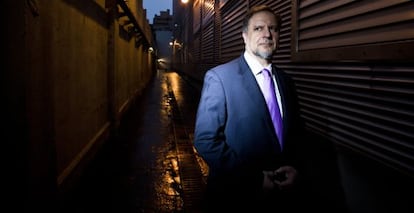“We arrested 120 ETA activists, but found no connection to the March 11 attacks”
Senior police investigator into the bombings Telesforo Rubio says that he and his team "followed up every doubt about who was behind the attacks, despite the insults being hurled at us”


Telesforo Rubio was driving his children to school when he heard about the bombings at Atocha train station on March 11, 2004, after which he went straight to his job, as a police commissioner in the Madrid district of Chamartín. “The general opinion at the station was that ETA was behind the attacks. But nobody had any real idea of what had happened,” he says. Three months later, he was appointed Commissioner General of Information, which made him the senior police officer in charge of the investigation into the bombings, a post he held for just over two years (he was replaced in 2006). A decade on, he has no doubts about what happened. “During my mandate, we captured 120 or so members of ETA, and we never found anything to connect the organization with the attacks, nor with radical Islamism. Nothing.” Since then, another 458 ETA activists have been arrested, and no connection has been established with the jihadists who bombed Atocha.
During his time at the head of the General Commissariat of Information (CGI) he was subjected to considerable media pressure from sections of the Spanish media that supported the idea of a combined police and Socialist Party conspiracy to cover up ETA’s supposed involvement in the bombings. “We had to follow up every doubt about who was behind the attacks, despite the insults being hurled at us.”
Question. When you took over at the CGI, the police investigation into the Atocha bombings was over. But you insisted on going through all the evidence again.
Answer. New information had emerged about the attacks, although we soon found that these were minor things that had already been covered by the investigators. Some of it had been dismissed, others included in the evidence for the trial, and others were still being investigated. But when I took over at the CGI, there were no investigations still pending that could link ETA to what happened on March 11. Nothing at all. But given all the doubts that were being raised we decided to go through everything with a fine toothcomb to clear up any questions.
Q. And the conclusion is that the attacks were carried out by the men who blew themselves up when discovered by the police?
A. The investigation was focused and efficient.
Q. But nobody knows just what it was that blew up on the trains…
A. I can only repeat the court’s verdict. I have no evidence to contradict it. I am convinced that verdict is the right one.
Rubio – who later went on to head the security attaché at the Spanish embassy in Moscow, and now occupies a low-profile position within the police force – says that when he took over at the CGI, his predecessor, Jesús de la Morena (who declined to talk to EL PAÍS), had left him a written handover of powers. “I was very surprised that the day I arrived at the new job, De la Morena had already begun working for a private security firm, so I had to find out for myself what was going on, what other anti-terrorism cases were underway.”
He says that when he took over at the CGI, he found it hard to believe that an attack on the scale of Atocha could have taken place in Spain. But his view soon changed as he began investigating the roots that radical Islam had laid.
“If you see the March 11 attacks in the context of 9/11, and then what happened three years later in London, or with what happened in Casablanca or the Paris metro, then you form a list of people and how they lived, the organizations they belonged to, how they worked, their relationships, and their communications, and all this reveals the logic of what happened here and what might have happened.”
Q. Did you ever find anything that might have suggested that the men who blew themselves up were not involved in the Atocha attacks?
A. No, we found nothing that had not already been investigated, which doesn’t mean that there weren’t other people involved who weren’t arrested, because there are genetic profiles whose identities are unknown. But in the end, they would be people who had already been arrested or are in prison. We may find them over time, but their involvement would be largely irrelevant.







































